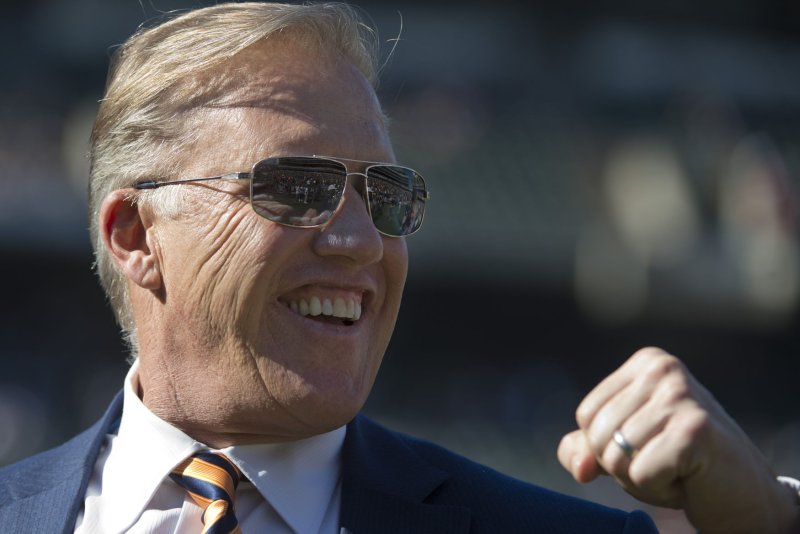Denver Broncos Executive VP John Elway. UPI/Terry Schmitt |
License Photo
Everyone knows about John Elway's history as a Hall of Fame quarterback but far fewer people can remember that Jerry Richardson caught a touchdown pass from Johnny Unitas in the 1959 NFL championship game.
That makes Super Bowl 50 unique for a reason other than its golden anniversary: The leaders of both franchises are former players with a championship pedigree. Richardson, in fact, is the first former player since George Halas to be the primary owner of an NFL team.
There is an old cliché that goes something like this: owners own and players play. But there is definitely something to be said for the guy running the team to understand what's going on beneath him in the organization.
It's not necessary, of course. Dan Rooney would be the first to tell you the Steelers don't have six Super Bowl victories, more than any other team, because he once was the all-city backup quarterback to a fellow named Johnny Unitas.
Besides the Super Bowl teams, only one other NFL team has a key decision maker with a distinguished record as a player: Baltimore general manager Ozzie Newsome was a Hall of Fame tight end who has put together two Super Bowl champions for the Ravens.
Sometimes, however, a football background can get in the way of success, although it's likely that the Dallas Cowboys' sorry recent history is due more to Jerry Jones' ego than his career as a college football player. Is that evidence of the old saying that a little knowledge is a dangerous thing?
It's not likely many people foresaw Elway as a leading executive during his playing days. His style bordered on the edge of being out of control, although it sometimes appeared that way because most Denver teams in those days lacked the essential parts, like strong offensive lines and a running game, to allow Elway to orchestrate a smooth offense.
More frequently, until Mike Shanahan brought in Terrell Davis to run the ball, Denver's offense was simply a product of Elway's athletic brilliance.
Nonetheless, Elway has made a terrific turn to the front office. Maybe he got Peyton Manning to finish his career in Denver only because of their shared history at quarterback, but it has taken more than that to turn around a team that went five years without a winning record before Elway was put in charge.
Further, Elway has assembled a team that does not revolve around its quarterback, but around its defense, which was the best in the NFL during the regular season.
On this team, Manning is only a complementary part, not the engine around which everything revolves.
In Elway's four seasons as the Broncos' GM since succeeding Ted Sundquist, Denver's regular season record is 50-14. That's actually better than any four-year stretch when Elway was playing quarterback.
"I think where it helps me is having played the game, had many teammates and knowing what I liked in a teammate and being drawn to those types of players that I would want on my football team," Elway said.
"I am drawn to that, and that's why I think my experience as a player has tremendously helped me in this position because of having been in a locker room and also what do I like in coaches, based on the different coaches that I had and the qualities of the different coaches I had. I think all of that experience has helped me tremendously."
Richardson is not day-to-day, hands-on with his team like Elway, having delegated that responsibility to general manager Dave Gettleman. But Richardson has taken personal responsibility for the Panthers ever since they were awarded an expansion franchise to begin play in 1995.
For starters, Richardson established a high bar as his opening goal, although the Panthers did not come close: Win two Super Bowls within a decade. They played in and lost, to New England, a Super Bowl in their ninth season, 2003.
Now in their 21st year, they are back again. That still puts Carolina way ahead of any other team that joined the NFL after the 1970 merger with the American Football League.
Of the NFL's half-dozen post-1970 expansion teams, Carolina is only the second to reach two Super Bowls, but the Panthers timetable is way ahead of Seattle, which has reached three Super Bowls since the Seahawks' beginning in 1976.
It took Seattle 30 seasons to reach the first one. Tampa Bay has reached and won one Super Bowl.
Cleveland, Houston and Jacksonville still are looking to get there for the first time.
And, if Richardson does not involve himself any longer in the day-to-day minutiae of running the team, few owners take more pride in what their organization does.
Six years ago, he even fired his sons from the front office because he didn't like their management style.
"He got in it to win, not just to own a team," one of the sons, Mark Richardson, told the Charlotte Observer. "He got in it to build a winning franchise and build a team that people can be proud of and have pride in calling the Panthers their team. I think he's accomplished all of those things. The final piece of the puzzle is to get the Lombardi Trophy."
Ira Miller is an award-winning sportswriter who has covered the National Football League for more than four decades and is a member of the Pro Football Hall of Fame Selection Committee. He is a national columnist for The Sports Xchange.















